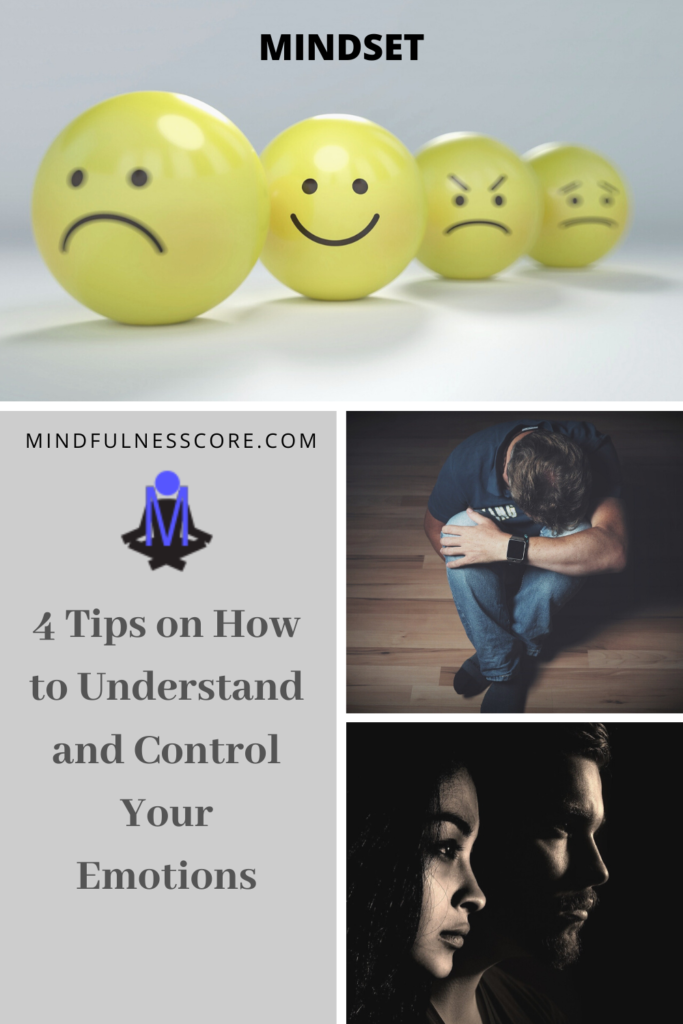4 Tips on How to Understand and Control Your Emotions
Good or bad, emotions are an imperative part of our lives. Emotions are much like feelings, but they are usually attached to an external event rather than a learned behavior. Considering our jam-packed schedules in this time and age and the versatility of events and experiences that we live on day to day basis, it won’t be wrong to state that you are always in a state of any particular emotion regardless of what time it is, where you are, or what you are doing. Think about it; you wake up in the morning and take a bath, you feel fresh – emotion. You go to work and find out that you have been promoted. You are happy – emotion. After a day of hard work, you get back to your home, you are tired – an emotion. Point being, our lives are surrounded by emotions and the way that we react to each one of them is what defines our personality and how people learn to see us.
Emotions are essential for human beings. But none of them are supposed to be permanent. Of course, everyone would want to never get off the ride of happiness. But even that can fade away. Since emotions are externally driven, a wide range of events and experiences can confront us with negative emotions; the likes of which are anger, frustration, stress, depression, sadness, etc. There is nothing wrong with having negative emotions, in fact, it is a sign of a healthy brain. But how you choose to react to each of your emotions has a significant impact on your life as well as on the lives of others in your circle. For instance, you apply for leave at your workplace and it is rejected by your boss. If you choose to throw a tantrum about it, it can jeopardize your livelihood while ruining the work environment for others as well. Even positive emotions like laughter at a wrong time can have an opposite effect. Say, for example, you choose to laugh at a funny message during a meeting with the board of directors of your company, what do you think will be the response that you will get?
This is how important it is to control your emotions. Remember, you are the one who should be in charge of controlling the emotions. The moment your emotions start to control you, it is time that you need help. Managing your emotions is like making a choice. For the most part, it is a simple matter of whether you want to control them or not. And yet, so many of us fail to win at this domain of life. It is because managing your emotions is like taking up a new habit or perhaps developing a new skill. It takes effort, it takes consistency, it takes patience, and most importantly, it takes being comfortable with change.
Considering how unchecked emotions could be a matter of an unnecessary complication, the effects of which reach both our personal and professional lives, we have highlighted a few of the basic strategies that you can use to control your emotions.
1. Focus On Understanding Your Emotions
The road to controlling your emotions essentially passes through the town of understanding. It may sound bizarre, but if you think about it, all of us struggle in identifying our emotions and putting a label to them from time to time. Therefore, the first step of controlling your emotions is to get an understanding of what you are feeling. If you are overreacting to a situation but you are completely unaware that you are overreacting, is there any way that you would think of crafting a solution? This is why it is important to give a name to your emotion. The easiest way that you can do it, is to stop fighting them. The reason why a lot of us fail to understand our own emotions is that we are constantly in a state of battle against them. The moment you stop running away, take a deep breath and allow yourself to feel whatever it is, you would be able to better understand the emotion.
Once you have a label to the negative emotion that you are experiencing at the moment, the next step to understanding it is to associate it with a “Why”. You need to sit and talk to yourself as a friend. Ask yourself, what is or what are the reasons why you are experiencing this negative emotion? What is currently wrong that is making you feel it? More often than not, the reason why we have a negative emotion is that we are headstrong about our perspective of the situation and are in self-denial that there could be more than what meets the eye. Once you have the answer to why you have a pretty strong hold of your emotion. The understanding part is now complete and you can move on to controlling and managing your emotions effectively.
2. A Few Minutes Of Meditation Goes A Long Way
When it comes to understanding and controlling your emotions, meditation is far more effective as compared to any medication that you can find in the market. Meditation and mindfulness are practices that originated from the Buddhist culture but are widely known for their positive impacts on mental health. This is the reason why it knows no boundaries of caste, creed, or religion when it comes to the practitioners and believers. Owing to its stunning effects on mental health, it is now a conspicuous component of medicine especially in psychology and conventional medicine.
The types and variations of meditation are plenty. But you should always start with the basics. Mindful breathing and mindful listening are two of the easiest to follow practices that help a great deal in effectively managing your emotions. The crux of both practices is the same. You need to be in a comfortable position in a peaceful environment. For mindful breathing, the idea is to shift your focus entirely to the process of breathing. Take deep slow breaths and get a sense of cold air alternatively filling and leaving your body. Similarly, in the case of mindful listening, you are required to choose a positive, harmless event in the present to focus on. Something connected to nature works particularly well in this regard. For instance, you can choose to focus on the sound of falling rain or the birds chirping, etc.
By enabling you to collect your focus and pour it into a positive, harmless event such as that of breathing or the sound of rain, mindfulness enables you to take your focus off the negative emotion that prevents you from inappropriately reacting to it. Such practices have also been associated with making you more calm and peaceful which further improves the clarity of your thoughts. With a clear vision, you are able to better understand your emotions and manage them effectively. Meditation is further known to help cope with the stress and anxiety of your routine life; two of the major causes of a myriad of negative emotions. It is only fair to state that the majority of our negative emotions are linked with the over-analysis of the past or overthinking about the future. By bring your entire attention to the present moment, to an event that is happening in the now, meditation can turn out to be a quick and effective tool that can be used to effectively understand and control your emotions.
3. Work For A Solution
As mentioned in the first tip, it is imperative that you understand your emotions before you embark upon a journey to manage and control it effectively. The reason is that understanding your emotion enables you to put a label of “WHAT” on your emotion while answering the “WHY”. Once you have the answer to why you can start the process of working for a solution that is the most natural and rational approach to controlling your negative emotion. More often than not, the answer for you lies in a simple change of perspective. For instance, if you are feeling bad about a meeting with your boss that didn’t quite go as expected, there are two options before you. You can cry about it for weeks, or, you can take a moment to understand your emotions and accept that you feel horrible. From there on, you can start to change your perspective and stop seeing it as a moment of shame, and instead, start to see it as an opportunity for improvement. Since you know the “why” you can start to think about what went wrong and what can you do better the next time to drastically change the outcome? Changing the perspective and focusing on a solution doesn’t only help to cope with the negative emotion and keep it checked, but it can also put us in the right direction for personal and professional growth.
4. What Is That Fixes Your Mood?
As mentioned earlier, controlling your emotions is a matter of choice. It is well within your power to decide whether or not you want to manage your emotions. Of course, when you are in a bad mood, you wouldn’t want to do anything at all. But that’s where the matter of choice pops out. A moment of voluntary decision to indulge yourself in a mood booster can help a great deal in managing the negative emotion. What needs to be realized is that an inappropriate reaction to negative emotion is because such an emotion fills our body with an amount of extra energy. If you can direct that energy into something positive, you can effectively prevent overreacting to a situation. One of the finest options at your disposal to keep your emotions checked is physical exercise. There are two reasons why this works. First of all, with physical exertion, you are making the best use of your extra energy. Secondly, physical exercises like working out at a gym are known to be associated with stimulating the production of happy hormones in the body. The increased levels of dopamine, serotonin, and endorphins help restore your mood which translates into the management of the negative emotions.
It is to be kept in mind, however, that people are different. What works for your friend may not always work for you as well. Therefore, if working out doesn’t work for you or it’s just something that you can’t find the will for when you are experiencing the low, you should focus on getting involved in any activity that triggers happiness in you. It could be painting, reading a book, talking to your best friend over the phone, eating ice cream, etc. Any number of activities that have the potential to make you happy is like your guard when it comes to effectively controlling your emotions. All that matters is that you make a voluntary decision and push yourself for the activity in times when you don’t feel like moving a bit.
Conclusion
Understanding your emotions and managing them effectively go hand in hand. You can’t possibly control your emotions and prevent yourself from overreacting if you fail to understand your emotions. Remember, having emotions is a mark of being a human being. And having the capacity to keep them checked, is a mark of a strong personality. If you happen to be the kind of person who has failed on multiple occasions to understand and control your emotions, you must invite all the patience that you have because it is surely going to take some time for you to master this art of managing your emotions. The above mentioned are the simplest of all strategies to control your emotions. You can start your journey with these and once you start to see the results, you’d be convinced to dig deeper and eventually stop your emotions from controlling you. It won’t be easy, but it’s a virtue worth having. Remember, you are working for your personal and professional growth here.


